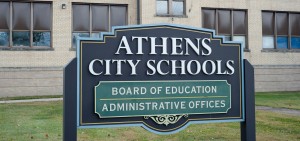News
Athens schools need more help in the classroom, but job candidates are proving hard to find
By: David Forster
Posted on:
ATHENS, Ohio (WOUB) — The Athens school district is trying to hire more professionals to support students with special needs, but it isn’t getting many applicants.

The additional hires are needed because of the number of students who have fallen behind or have behavioral challenges, or both.
“Right now, the numbers are just significantly higher than typical and we need to make sure that we have all the resources available to make sure those students are being successful,” said Superintendent Tom Gibbs.
For example, the number of second and third graders on an individualized education program, or IEP, is over 25 percent.
IEPs are developed for students who are not performing at grade level or at least not up to their ability. Typically about 14 to 16 percent of second and third grade students in the Athens district are on an IEP.
Gibbs said the much higher percentage the district is seeing now is at least in part a carryover from the pandemic. Some of these students would have been in preschool when the schools were closed and switched to remote learning, but many preschools were simply shut down during this period.
“Those early learning years are so important to child development, to brain development,” Gibbs said. “And so it takes a lot of extra resources to really just help students get up to what would be the more typical expectations for students in that grade level.”
Students on an IEP don’t necessarily have a learning disability but may simply have fallen behind. But once they’re on an IEP that’s considered special education and it requires a certified intervention specialist.
The district is trying to hire three more intervention specialists, one each for East Elementary, Morrison-Gordon Elementary and The Plains Intermediate School.
The district also wants to hire at least three more paraprofessionals who can help out teachers inside and outside the classroom. This includes working with students who have behavioral issues.
“I think most classroom teachers would agree that one of the biggest challenges they confront is student behavior,” Gibbs said.
“We’re seeing an increase in really high-end, atypical behavior that can be very disruptive on a day-to-day basis.”
This includes loud and sometimes angry outbursts, and generally just not cooperating with teachers and other students. The district is also seeing more runners: Students who will suddenly take off and try to leave the classroom or the school building.
“So it’s just a really labor intensive situation right now,” Gibbs said.
“We want to make sure we’re trying to provide supports for those students so that they can continue to get an education,” he said. “But also do it in a way that it’s not completely distracting for the classroom teachers and for the other students who are trying to get their education as well.”
Gibbs said he’s not sure why there has been such an increase in behavioral challenges. He noted that more students coming into the district are already on IEPs or have already been manifesting behavioral issues.
Gibbs emphasized that on the whole, students in the district are performing better and making up much of the ground lost during the pandemic, but teachers need more help with the unusually high number of students who are struggling.
“We really need to be providing enough support so that we don’t have teachers getting burned out,” he said. “It’s a stressful job already and we want to make sure that we’re trying to do what we can to support them.”
The district has been advertising for more intervention specialists and paraprofessionals for over a month with little interest so far in the positions, which are full-time with benefits. Gibbs wonders if this also is a lingering effect of the pandemic, which resulted in national labor shortage that continues to plague employers.
Gibbs acknowledged there is a statewide shortage of certified intervention specialists. But he said it’s possible to hire an otherwise qualified teacher under an emergency license, allowing them to work while they take the additional coursework needed to get their special education certification. And scholarships are available.
A teaching license is not required for paraprofessionals. They must have the equivalent of a two-year college degree or have passed the paraprofessional test.
Working as a paraprofessional is a good route for those who are already in the work force and are interested in becoming a teacher, Gibbs said. The time spent in the classroom can count toward the required student teaching experience, which means they don’t have to quit their day job to get this.
Anyone interested in applying for a position in the Athens school district can contact the superintendent’s office at 740-797-4544 ext. 1202 or send an email request to dbowles@athenscsd.org for an application.

